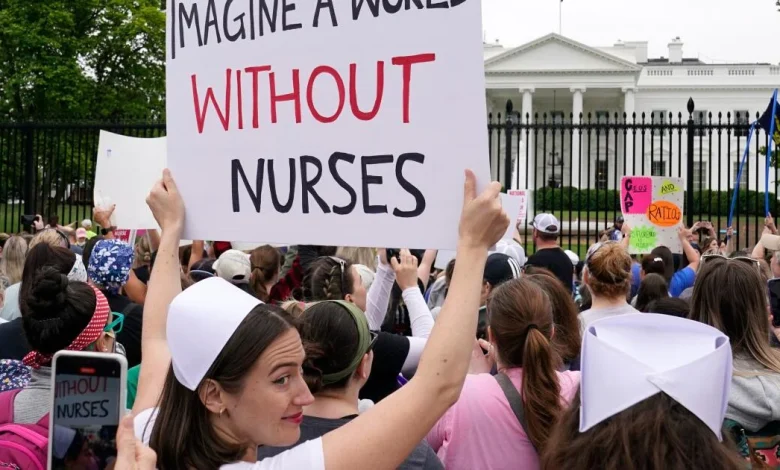Why outrage is erupting over Trump plan to exclude nursing from ‘professional’ designation

WASHINGTON — A coalition of nursing and other healthcare organizations are outraged over a Trump administration proposal that could limit access to federal loans for some students pursuing graduate degrees, because the government would no longer label their studies as “professional” programs.
Without such a U.S. Department of Education designation, students pursuing graduate degrees in nursing and at least seven other fields, including social work and education, would face tighter federal student loan limits.
The revamp is part of Trump’s “Big Beautiful Bill” passed by Congress, and is prompting anger and confusion, particularly among nurses who are lashing out online. Some social media posts have amplified inaccurate information about the changes — leading the Education Department to issue a “Myth vs. Fact” explainer on the proposed modifications.
But it has done little to quell the furor. Nurses and others affected not only oppose potential limits on educational borrowing to advance their careers, but perceive the move as a semantic insult that disrespects the intense training that is required to achieve their professional credentials.
One Instagram user — a self-described registered nurse with more than 250,000 followers on the platform — said that she had planned to attend graduate school to become a nurse practitioner, but the proposed loan caps may put that out of reach. “They don’t want us to continue our education,” she said. “They want women to be barefoot and pregnant.”
Susan Pratt, a nurse who is also president of a union representing nurses in Toledo, Ohio, called the move “a smack in the face.”
“During the pandemic, the nurses showed up, and this is the thanks we get,” she said.
The Education Department did not respond to a request for comment about the proposed rule changes. But its explainer said that “progressive voices” had “been fear mongering” about the changes and spreading “misinformation.”
The Trump administration has said limits on graduate school loans are needed to reduce tuition costs and believes that capping student loans will push universities charging higher-than-average tuition to look at lowering rates.
What counts as a ‘professional’ program
While graduate students could previously borrow loans up to the cost of their degree, the new rules would set caps depending on whether the degree is considered a graduate or professional program. For program without a “professional” designation, students would be limited to borrowing $20,500 a year and up to $100,000 total.
Students in a designated professional program would be able to borrow $50,000 a year and up to $200,000 in total.
To define what counts as a professional program, the department turned to a 1965 law governing student financial aid. The law includes several examples of professional degrees but says it isn’t an exhaustive list. The Trump administration’s proposal, by contrast, says only the degrees spelled out in the new regulation can count as professional programs.
The Education Department would define the following fields as professional programs: pharmacy, dentistry, veterinary medicine, chiropractic, law, medicine, optometry, osteopathic medicine, podiatry and theology.
Left out are nursing, physical therapy, dental hygiene, occupational therapy and social work — as well as fields outside of healthcare such as architecture, education, and accounting.
One in six of the nation’s registered nurses held a master’s degree as of 2022, according to the American Assn. of Colleges of Nursing.
The federal fact sheet noted that a “professional degree” is merely an internal definition it uses “to distinguish among programs that qualify for higher loan limits.” It is “not a value judgement about the importance of programs … It has no bearing on whether a program is professional in nature or not.”
The federal rules would take effect in July, but can still be changed by the Education Department after a public comment period.
Nursing leaders decry the change
Jennifer Mensik Kennedy, president of the American Nurses Assn., decried the proposed changes, saying they would widen an already painful shortfall of advanced practice nurses — whose roles require graduate degrees. Among them are nurse practitioners, who are able to diagnose illnesses and write prescriptions.
“Nurse practitioners provide the largest amount of primary care services in the United States,” she said. “We have a primary care shortage right now. And we’re going to continue [to have one]. Now we’re not going to fully allow nurse practitioners to get the funding they need.”
Kennedy said the new rules would exacerbate the California and nationwide nursing shortage because in most cases a doctoral degree is required to teach other nurses.
“We are short over 2,000 nursing faculty in the United States,” she said. “So this has a downward spiral effect.”
But the Education Department’s “Myth vs. Fact” sheet, released Monday, argued that its data shows that “95% of nursing students borrow below the annual loan limit and therefore are not affected by the new caps.”
“Further, placing a cap on loans will push the remaining graduate nursing programs to reduce their program costs, ensuring that nurses will not be saddled with unmanageable student loan debt,” the department said.
Kennedy said it would be very difficult for graduate nursing programs to cut costs, because of their focus on hands-on training. “I’m not quite sure where the schools in nursing are supposed to cut, because the faculty are already underpaid, and those workloads are at a point where it’s keeping the public safe training new nurses,” she said.
Lin Zhan, dean of the UCLA Joe C. Wen School of Nursing, said the proposed changes are “deeply concerning” and urged policymakers to reject them.
“We cannot afford to create barriers that limit entry and growth in this essential profession and any policy changes must prioritize expanding access and enabling professional nurses to practice with knowledge and compassion,” Zhan said. “Graduate-prepared nurses play a critical role across health care. … Their expertise is vital, especially as care becomes more complex and patient needs grow.”
A coalition of healthcare organizations has also urged the Education Department to change course and noted that fields being excluded are largely filled by women. According to a U.S. Census Bureau report in 2019, women made up about three-fourths of the full-time, year-round healthcare workers in the U.S. and accounted for a much higher share in jobs such as dental and medical assistants.
Deborah Trautman, president of American Assn. of Colleges of Nursing, said in a statement to The Times that “reducing the federal student loan limit for nurses pursuing master’s and doctoral degrees will likely discourage many from advancing their education.”
“Yet nurses prepared at these levels are essential to the workforce — as advanced practice nurses, faculty, researchers, and expert clinicians,” she said.
Associated Press reporters Collin Binkley and John Seewer contributed to this story.





